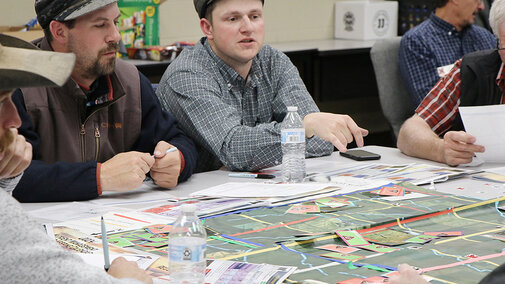Tootsie rolls, a five-gallon bucket, and a plastic drop cloth were all part of the hands-on training at the Nebraska Extension workshop “Manure Better” with land application training on Feb. 19 at the UNL Panhandle Research, Extension and Education Center in Scottsbluff, Nebraska.
“What we teach hasn’t changed,” said Leslie Johnson, Nebraska Extension animal manure management coordinator and educator. “How we teach it has changed. Previously, it was just research. Now, it lets us look at this field and how it works for this operation and then tailor it down to the operation.”
The students used the previously mentioned bucket and tootsie rolls to weigh and calibrate the manure without the mess of natural manure.
The focus is turning manure nutrients into better crop yields while protecting the environment. To do this, participants have multiple hands-on activities, from calculating and calibrating manure applications to looking at the nutrients and crop needs.
“Weighing manure using calibration or verification, as I’m beginning to think of it,” Johnson explained. “When applying the manure, we can’t make adjustments on the fly, but can make a change later with our commercial application.”
The whole purpose is to spread manure on land in an agronomic manner so we can protect water quality. Produce the best crop we can and do it in a manner to protect the environment. If the producer doesn’t know how much manure or nutrients they have actually applied to the land, the crops could be deficient in nutrients, which could mean yield loss. Too many nutrients and the risk is contamination of water or the environment.
To learn more, visit UNL Water's Animal Manure Management site.
The Nebraska Extension Animal Manure Management Team sponsors the workshops.

